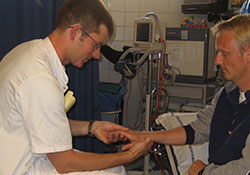Dr Nikolaj Bjerrum Hancock is a junior doctor at Glostrup Hospital Emergency Room in Copenhagen, Denmark

Nikolaj Bjerrum Hancock
“I chose medicine because I was fascinated with the workings of the human body, but being a doctor is very different to studying medicine. I have learned the theory and now have to put it into practice with real people. I have just completed six and a half years of medical studies and I am assigned to the orthopaedic surgery ward, but I work mostly in the emergency ward.
In the ward I am the first doctor to examine a patient, and it is my job to respond to the urgent situation, provide the initial care and then arrange consultations with other doctors who specialize in other areas of medicine. So I refer serious accidents on to more experienced colleagues.
The greatest challenge I face in my work is the diversity of problems and patients, and dealing with patients with very different backgrounds and cultures. Every day is different, I never know what to expect. Friday and Saturday evenings and nights are busier than the rest of the week, and the people who come in have often been drinking. It is quite a challenge examining people with head traumas when they are drunk, as they can have difficulty following instructions: once a woman came in drunk, and her shoulder was dislocated. While a colleague and I tried to put it back in place by pulling with all our strength, she just kept asking if we wanted to marry her.
Sometimes people come in with minor accidents and you wonder why they even bother to come. People don’t realize how much it actually hurts when something is broken: a man recently turned up, he had come to check if he had broken his hand. I came in and he shook my hand, using the injured hand!
I feel a sense of immense satisfaction when I am able to treat a problem successfully on my own (as do my patients), and to know that, when they leave, they feel well taken care of. At the moment I am not dealing with critically ill patients. I also work in a surgical ward, where patients usually expect an operation followed by a full recovery, and often this is the case. In the emergency ward, the patients hope for quick treatment, but I doubt that many expect it. Most emergency rooms are calm, with people waiting for hours to be seen by a doctor.
Everyone in Denmark, irrespective of nationality and status, is entitled to free hospital care in an emergency. On the whole, I think we have a well-functioning health system here in Denmark, but, now that I am working in the system, I can see much room for improvement. I would like to see shorter waiting times and treatment given by experienced senior doctors, but then I guess I wouldn’t get any experience. When I think of health systems, the first thing that comes to mind is hospitals, perhaps because I work in a hospital. However, health systems go beyond hospital treatment to include many other aspects of health: for example, implementing vaccination campaigns, improving the environment, providing cheaper fruit and vegetables, and promoting exercise and healthy lifestyles."


